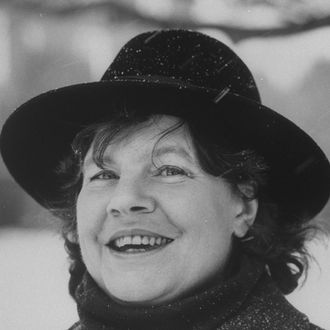
Dame Antonia Susan (A.S.) Byatt, the scholar and writer best known for her Booker PrizeÔÇôwinning novel Possession, is dead at 87. She died peacefully at home with family, according to a statement by her publisher. Byatt was both a critic-scholar and a novelist during her life, releasing 24 works, including both criticism and fiction, in her lifetime. Byatt was born in August 1936 in York, and attended Newnham College, Cambridge, and Bryn Mawr College before attending postgraduate studies at Somerville College in Oxford. Her first novel, The Shadow of the Sun, was published by Chatto & Windus in 1964. By 1972, Byatt was working full-time as a lecturer in English and American literature at University College, London, though she left in 1983 to focus on writing.
ByattÔÇÖs most well-known work is 1990ÔÇÖs Possession: A Romance, a postmodern work set between the thenÔÇôpresent day and Victorian England, following fictional poets Randolph Henry Ash and Christabel LaMotte. The book won the Booker Prize upon its release, and it was called a ÔÇ£gloriously exhilarating novel of wit and romance.ÔÇØ She was later again shortlisted for a Booker Prize in 2009 for her novel The ChildrenÔÇÖs Book. Her last published work was a 2021 collection of short stories titled MedusaÔÇÖs Ankles: Selected Stories.
ÔÇ£AntoniaÔÇÖs books are the most wonderful jewel-boxes of┬ástories and ideas.┬áHer┬ácompulsion to write┬á(A4 blue notebook always to hand)┬áand her ability┬áto create┬áintricate skeins of┬ánarrative was┬áremarkable.┬áIt┬áwas always┬áa treat to see her, to┬áhear updates about┬áher┬áevolving┬áliterary┬ácharacters and indulge in delicious┬átitbits of┬áliterary gossip,ÔÇØ Clara Farmer, ByattÔÇÖs publisher at Chatto & Windus, said in the statement. ÔÇ£She could hold the germ of a story in her head for a long time, sometimes for years, but when it emerged she would work on it assiduously in her notebooks and in conversations, reading widely to clarify the background of intellectual movements and artistic ideas, and mapping every scene in detail in her head, from the colours of clothes and the names of minor characters ÔÇö which were often bizarre ÔÇö to the complexity of train timetables,ÔÇØ Jenny Uglow, her longtime editor, added in the statement. ÔÇ£Finally, the shape was fully formed in her mind.┬áThen it would flow on to the page, with not a change to be made.ÔÇØ


